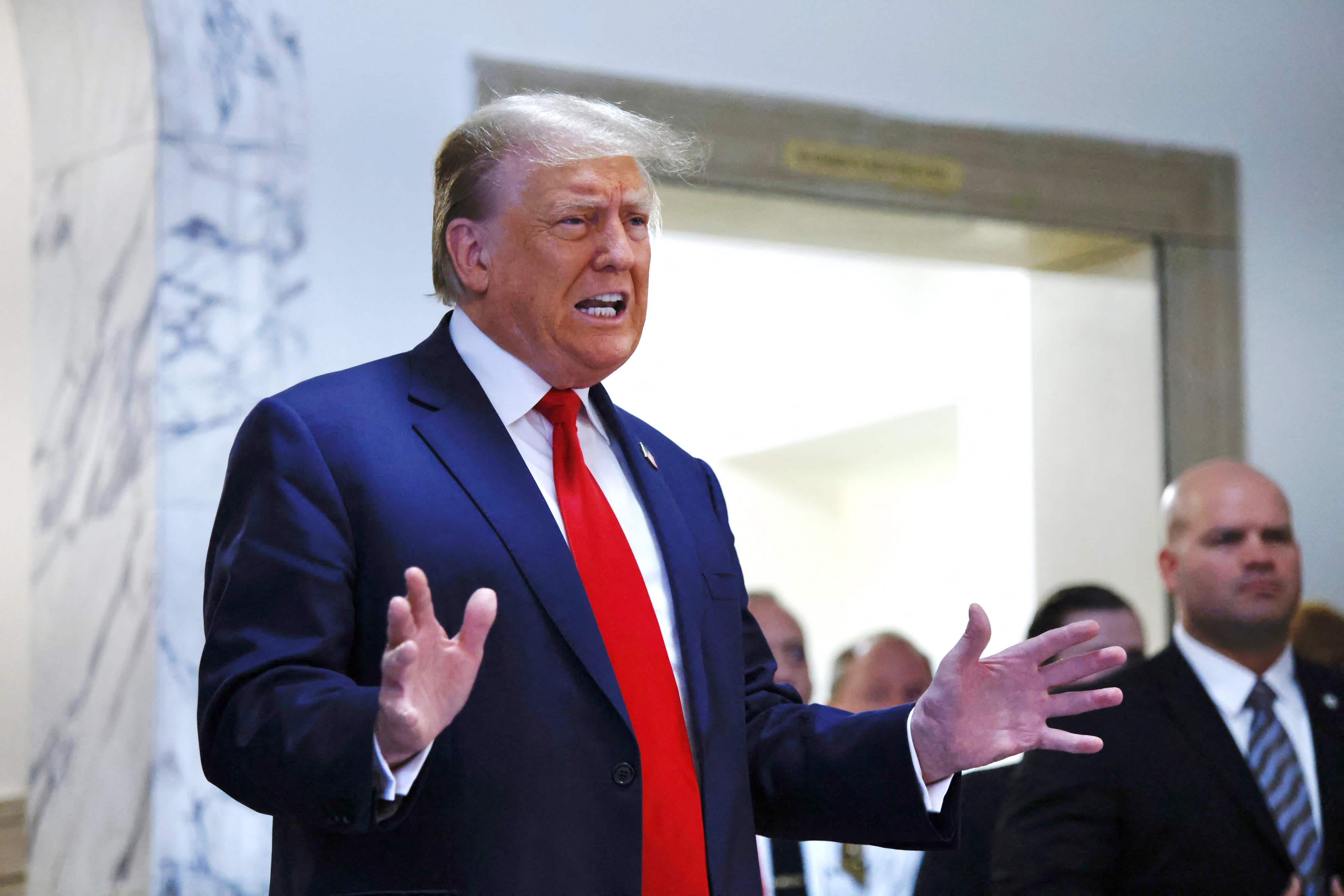How much is Donald Trump's Mar-a-Lago worth? That's been a point of contention after a New York judge ruled that the former president exaggerated the Florida property's value when he said it's worth at least $420 million and perhaps $1.5 billion.
Siding with New York's attorney general in a lawsuit accusing Trump of grossly overvaluing his assets, Judge Arthur Engoron found that Trump consistently exaggerated Mar-a-Lago's worth. He noted that one Trump estimate of the club's value was 2,300% times the Palm Beach County tax appraiser's valuations, which ranged from $18 million to $37 million.
But Palm Beach real estate agents who specialize in high-end properties scoffed at the idea that the estate could be worth that little, in the unlikely event Trump ever sold.
"Ludicrous," agent Liza Pulitzer said about the judge citing the county's tax appraisal as a benchmark. Homes a tenth the size of Mar-a-Lago on tiny inland lots sell for that in the Town of Palm Beach, a wealthy island enclave.
"The entire real estate community felt it was a joke when they saw that figure," said Pulitzer, who works for the firm Brown Harris Stevens.
Get Tri-state area news delivered to your inbox. Sign up for NBC New York's News Headlines newsletter.
"That thing would get snapped up for hundreds and hundreds of millions of dollars," said Rob Thomson, owner of Waterfront Properties and a Mar-a-Lago member. "There is zero chance that it's going to sell for $40 million or $50 million."
In the ongoing trial over the lawsuit, though, what a private buyer might pay for a place like Mar-a-Lago isn't the only factor in determining whether Trump is liable for fraud.
What is Mar-a-Lago?
The 126-room, 62,500-square-foot (5,810-square-meter) mansion is Trump's primary home. It is also a club, private beach resort, historical artifact and banquet hall with a ballroom that features gold leaf. It is where Trump stored government documents federal prosecutors say he took illegally after leaving office in 2021.
While Trump has long admitted using "truthful hyperbole" in his business dealings, he is not exaggerating when he calls Mar-a-Lago unique.
Built in 1927 by cereal heiress Marjorie Merriweather Post and her second husband, financier E.F. Hutton, she gave the property its name — Spanish for "sea-to-lake" — because its 17 acres (7 hectares) stretch from the Atlantic Ocean to the Intracoastal Waterway.
Post kept the mansion after the couple's divorce, using it to host opulent galas. In 1969, Mar-a-Lago was designated a National Historic Landmark.
Post, who died in 1973, bequeathed the property to the U.S. government as a winter get-away for presidents, but Richard Nixon, Gerald Ford and Jimmy Carter never used it. The government, citing the high upkeep costs, returned it to Post's foundation in 1981.
The property fell into disrepair. Trump bought it in 1985 for about $10 million, the equivalent of $30 million today. He invested heavily in its refurbishment.
By the early 1990s, however, Trump was in financial distress after several of his businesses flopped. He told Palm Beach town officials he couldn't afford the $3 million annual upkeep, and proposed subdividing the property and building mansions. The town rejected the plan.
Negotiations continued and in 1993 the town agreed he could turn the estate into a private club, giving him cash flow he could use for maintenance. He built the ballroom, but signed away development rights.
The agreement limits the club to 500 members — the initiation fee is $500,000 with annual dues of $20,000.
Trump typically lives at Mar-a-Lago from October to May before summering in New Jersey.
So what is Mar-a-Lago worth?
That's hard to say. The biggest problem is there are no comparable properties. No one builds mansions in Palm Beach like Mar-a-Lago anymore and those that did exist were demolished long ago, broken up or turned into a museum.
Trump, in an April deposition, justified his belief that Mar-a-Lago could be worth $1 billion by comparing it to the price the Mona Lisa or a painting by Renoir would command — the ultra-wealthy will pay a premium to buy something that's one-of-a-kind.
Eli Beracha, chair of Florida International University's Hollo School of Real Estate, agreed it's difficult to assess the value of any unique property. The fact that Trump owned Mar-a-Lago would likely increase its sale price.
"Some people are going to argue that not everyone likes Trump — some people would actually pay less because of that. … But the high bidder is probably going to be a person who buys it because it belonged to Trump," Beracha said.
Pulitzer said the rock-bottom price for Mar-a-Lago would be $300 million. Thomson said at least $600 million. If uber-billionaires got into a bidding war, they said, a sale of a billion dollars or more would be possible.
The much smaller Palm Beach compound once owned by the Kennedy political dynasty sold for $70 million three years ago.
So how did Palm Beach County come up with such a low tax assessment?
The county gives Mar-a-Lago its current value for taxation of $37 million based on its annual net operating income as a club and not on its resale value as a home or its reconstruction cost. It is one of nine private clubs in the county taxed that way.
Becky Robinson, the tax assessor's spokesperson, said that method is used because private clubs are so rarely sold or built, making it impossible to set their tax rates by comparing them to similar properties. Mar-a-Lago's property tax bill will be $602,000 this year, county records show.
U.S. Rep. Jared Moskowitz, a South Florida Democrat, wrote the county saying if Trump claims Mar-a-Lago is worth $1 billion, he should be taxed accordingly. If Mar-a-Lago had a $1 billion assessed value, it's property tax bill would be approximately $18 million.
Why it matters
Robinson said the county bases its assessments on the law and its formulas, not the value owners claim.
In her lawsuit against Trump, New York Attorney General Letitia James argued that Mar-a-Lago was one of multiple assets Trump overvalued in financial statements given to banks and others.
On those statements, Trump valued Mar-a-Lago as high as $739 million — a figure James said ignored deed restrictions requiring the property to be used as a social club — not a private home. Her lawyers have argued that in his financial statements, Trump should have valued Mar-a-Lago the same way the county does, based on its club status.
Trump's financial statements, the New York lawyers wrote, valued the club "based on the false and misleading premise that it was an unrestricted residential plot of land that could be sold and used as a private home, which was clearly not the case."
Trump's lawyers have said no trickery was involved, and that banks probably didn't rely on his financial statements anyway when determining whether to lend him money.



